Eleven banks, including Citigroup Inc., France’s Société Générale SA and Norway’s DNB ASA, say they will take climate considerations into account when extending new shipping loans.
The goal is for the ship-financing sector to support an industry target to cut greenhouse-gas emissions by half in 2050.
The banks, which have a combined shipping portfolio of about $100 billion, or about one-fourth of the global ship-finance market, have signed on to an industrial framework known as the Poseidon Principles, which seeks to direct new money for shipping toward environmentally-friendly, oceangoing vessels.
“As banks, we recognize that our role in the shipping industry enables us to promote responsible environmental stewardship throughout the global maritime value chain,” said Michael Parker, global industry head of shipping and logistics at Citi.
Mr. Parker said the banks will look at the type of ship, the kind of fuel it uses and other criteria that will support a target by the International Maritime Organization, the global marine regulator, for ships to pare back their emissions compared with 2008 levels.
“We hope that around 90% of lenders will sign the Poseidon Principles,” Mr. Parker said, adding that Chinese lenders could join by next year.
Chinese banks control about 25% of all ship finance and more than half of all shipbuilding capacity, according to shipping and bank executives.
“We will say yes for those kind of vessels that contribute to green shipping and no to others that are not needed in the world fleet. Secondhand ship financing will become more difficult,” Mr. Parker said.
Paul Taylor, global head of shipping and offshore at Société Générale, said the new loan criteria will help banks “to align and de-risk portfolios in line with shipping’s green transition.”
Other founding signatories include Danske Bank A/S, Dutch bank ABN Amro Group NV and France’s Crédit Agricole SA. The principles are also supported by some of the industry’s biggest ocean cargo movers, including Danish shipping giant A.P. Møller-Maersk A/S, agriculture commodities giant Cargill Inc. and Belgium-based tanker operator Euronav NV.
The International Maritime Organization has taken the first step to reduce ship sulfur emissions by more than 80% starting next January, when cleaner ship fuels will become obligatory.
Experts say cutting carbon-dioxide emissions substantially over the coming years will require that new vessels begin running on alternative fuel sources such as biofuels or hydrogen batteries. Ships that run on such fuels could take years to develop, according to industry executives.

